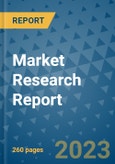The global palladium market is set for significant expansion, with an impressive CAGR of approximately 6% expected during the period from 2023 to 2030. By the end of the decade, the palladium market is projected to approach a valuation of nearly US$25 billion.
Driving Innovation and Sustainability in the Palladium Market
The palladium market encompasses the worldwide trade and consumption of palladium, a precious metal belonging to the platinum group of elements. Palladium holds critical importance across various industrial sectors, notably in the automotive industry, where it is used to manufacture catalytic converters aimed at reducing harmful vehicle emissions. This precious metal also finds application in jewelry, electronics, dental equipment, chemical processing, and more. Industrial activity and economic growth can influence palladium demand in specific regions. However, it's important to note that palladium mining and processing may have environmental impacts.
Sustainability and Green Technologies: Catalysts for Growth
Palladium production and availability may face increasing scrutiny due to mounting public awareness of environmental issues and calls for responsible sourcing. The growing emphasis on sustainability and green technologies presents an opportunity for palladium demand to surge. Hydrogen fuel cells, gaining popularity as an alternative power source for various applications, heavily rely on palladium.
Key Report Findings
- Steady Growth: The global palladium market is anticipated to expand at a robust rate of 5.7% CAGR from 2023 to 2030.
- Urbanization Spurs Demand: The rising rate of urbanization is a key driver, increasing the need for palladium in transportation, infrastructure, and electronics.
- Catalytic Converters in High Demand: Demand for catalytic converters remains strong in the palladium market, particularly in the automotive sector.
- Automotive Sector Leads: In 2022, the automotive category claimed the highest revenue share in the palladium market.
- North America Leads the Way: North America is expected to maintain its leadership position, while the Asia Pacific palladium market is poised for the most robust growth until 2030.
Urbanization: A Catalyst for Palladium Demand
The accelerating pace of urbanization is a significant catalyst for the palladium market's growth. Urbanization involves the migration of people from rural to urban areas, leading to the development of urban centers and supporting infrastructure. This trend has several implications for palladium demand and consumption.
As urbanization progresses, more individuals move to cities, resulting in increased transportation needs. The requirement for vehicles equipped with palladium-based catalytic converters to comply with government emission regulations aimed at improving air quality in densely populated areas is a common outcome of this rising vehicle ownership and usage. Additionally, rapid infrastructure development, including roads, bridges, and public transportation networks, becomes imperative. Palladium plays a crucial role in electronic equipment and building materials, making it an essential component of urban infrastructure projects. Urbanization also leads to increased consumer spending power and the adoption of modern technologies, driving the demand for palladium in electronics.
Rising Automotive Demand Drives Palladium Growth
- One of the primary growth drivers of the palladium market is the increasing demand for palladium in the automotive sector. Governments worldwide have enacted stricter emission limits to combat air pollution and reduce greenhouse gas emissions. To meet these stringent standards effectively, manufacturers must incorporate more palladium in catalytic converters. Historically, both petrol and diesel engine catalytic converters primarily utilized platinum as their primary metal.
- However, automotive manufacturers have been transitioning from platinum-based catalytic converters to those containing a higher proportion of palladium due to its competitive pricing compared to platinum. Demand for gasoline-powered vehicles, which require catalytic converters made of palladium, has surged, particularly in developing countries and regions lacking electric vehicle infrastructure. The expansion of the global automotive industry, particularly in countries such as China and India, is driving the increasing demand for palladium.
Challenges: Price Volatility and Geopolitical Tensions
- Price Volatility: Price fluctuations pose a significant challenge to the expansion of the palladium market. The term "price volatility" refers to rapid and significant price swings in palladium over short periods. High price volatility can introduce uncertainty for market participants, potentially impacting their decision-making processes.
- Geopolitical Tensions: Ongoing geopolitical tensions, such as the Russia-Ukraine conflict, have raised concerns about supply-demand imbalances in the palladium market. Russia is a major supplier of palladium globally, and disruptions in the supply chain due to geopolitical conflicts can lead to elevated prices and supply shortages.
Overview of Key Segments
- Primary Palladium Demand: The automotive segment is expected to be the fastest-growing within the palladium market, with applications in electronics, emission control systems, and ornamental purposes.
- Automotive Dominance: The automotive segment continues to dominate the global market due to the significant role of palladium in catalytic converters, which are essential in reducing harmful emissions.
- Regional Insights
- China's Leading Role: Asia Pacific is poised to lead the palladium market, driven by the uptake of environmentally friendly technologies like hydrogen fuel cells, where palladium plays a crucial role.
- Sustainability and Recycling: China's economic growth and industrial activity contribute to palladium demand, while recycling initiatives help maintain a sustainable supply chain.
Palladium Market: Competitive Landscape
Prominent players in the global palladium market include Norilsk Nickel, JSC Krastsvetmet, Sibanye-Stillwater, Anglo American Platinum Limited, Impala Platinum Holdings Limited, Glencore Plc, Northam Holdings, and Vale S.A.
Table of Contents
Companies Mentioned
- Norilsk Nickel
- JSC Krastsvetmet
- Anglo American Platinum Limited
- Sibanye-Stillwater
- Impala Platinum Holdings Limited
- Glencore Plc
- Northam Holdings
- Vale S.A.
- African Rainbow Minerals
- Southern Palladium Limited
- Galileo Mining L








